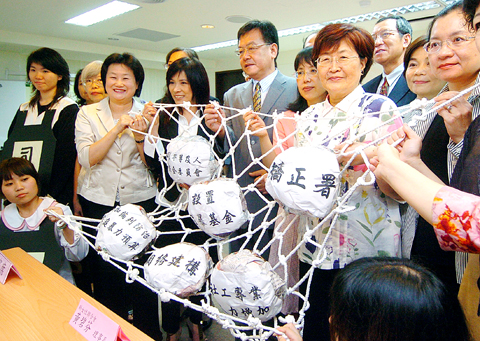The Taiwan Coalition Against Violence (TCAV) lauded the significant steps made in the country’s campaign to end domestic violence since the Domestic Violence Law (家暴法) was adopted 10 years ago, but said more measures, including to protect victims, were still desperately needed.
“The most important achievement [in the campaign against domestic violence] is that government authorities are now more active in helping victims. Ten years ago victims were pretty much on their own,” Gau Fehng-shian (高鳳仙), TCAV chairwoman and a Taiwan High Court judge, told a forum in Taipei yesterday.
The coalition said that domestic violence includes any violence within a family, not only violence against women and children.

PHOTO: FANG PIN-CHAO, TAIPEI TIMES
The passage of the law a decade ago was a significant step, since domestic violence has traditionally been considered a family problem that the public should not interfere in, Chinese Nationalist Party (KMT) Legislator Yang Chiung-ying (楊瓊纓) said.
Yet despite the progress over the past decade, the forum participants all agreed that crucial improvements to the handling of abuse cases, particularly in regards to the protection offered to victims of domestic violence, were still sorely needed.
Administrative efficiency must also be improved, they said.
“It can sometimes take up to 40 days before a judge issues a protection order on behalf of a victim of domestic violence,” Gau said. “As for emergency protection orders, the law states that they should be issued within four hours of a victim filing an application, yet it usually takes one, two or sometimes even three days.”
“I wonder how effective a protection order is after that many days,” Gau said.
TCAV vice chairwoman Chou Ching-yu (周清玉) said authorities still lacked adequate manpower to deal with this serious issue.
“In the first year after the Domestic Violence Law was adopted, more than 10,000 cases of domestic violence were reported. And last year, the number grew to more than 70,000,” Chou said. “Yet the number of social workers [available] to look after the cases hasn’t changed much.”
TCAV board member Lai Mei-hui (賴美惠) attributed the lack of manpower and other resources to underfunding and said the government should set up a domestic violence victim assistance fund.
“I suggest that the government create a fund with a total of NT$3 billion [US$98.7 million] over the next 10 years to assist victims of domestic violence,” she said. “The money could come from fines for domestic violence and sexual harassment cases, as well as bail money for such cases.”
Deputy Minister of the Interior Lai Fong-wei (賴峰偉), who attended the forum, promised to communicate all the suggestions and comments to the ministry for consideration.
He said the government should consider reforms to attract more social workers to handle domestic violence cases.
“At the moment, these social workers are contractors — not public servants — and thus are offered lower wages and excluded from promotions and other government benefits,” he said. “I’ll push for a reform to include contractor social workers into the government’s promotion and benefit system so that we may attract more such people.”

A year-long renovation of Taipei’s Bangka Park (艋舺公園) began yesterday, as city workers fenced off the site and cleared out belongings left by homeless residents who had been living there. Despite protests from displaced residents, a city official defended the government’s relocation efforts, saying transitional housing has been offered. The renovation of the park in Taipei’s Wanhua District (萬華), near Longshan Temple (龍山寺), began at 9am yesterday, as about 20 homeless people packed their belongings and left after being asked to move by city personnel. Among them was a 90-year-old woman surnamed Wang (王), who last week said that she had no plans

China might accelerate its strategic actions toward Taiwan, the South China Sea and across the first island chain, after the US officially entered a military conflict with Iran, as Beijing would perceive Washington as incapable of fighting a two-front war, a military expert said yesterday. The US’ ongoing conflict with Iran is not merely an act of retaliation or a “delaying tactic,” but a strategic military campaign aimed at dismantling Tehran’s nuclear capabilities and reshaping the regional order in the Middle East, said National Defense University distinguished adjunct lecturer Holmes Liao (廖宏祥), former McDonnell Douglas Aerospace representative in Taiwan. If

TO BE APPEALED: The environment ministry said coal reduction goals had to be reached within two months, which was against the principle of legitimate expectation The Taipei High Administrative Court on Thursday ruled in favor of the Taichung Environmental Protection Bureau in its administrative litigation against the Ministry of Environment for the rescission of a NT$18 million fine (US$609,570) imposed by the bureau on the Taichung Power Plant in 2019 for alleged excess coal power generation. The bureau in November 2019 revised what it said was a “slip of the pen” in the text of the operating permit granted to the plant — which is run by Taiwan Power Co (Taipower) — in October 2017. The permit originally read: “reduce coal use by 40 percent from Jan.

‘SPEY’ REACTION: Beijing said its Eastern Theater Command ‘organized troops to monitor and guard the entire process’ of a Taiwan Strait transit China sent 74 warplanes toward Taiwan between late Thursday and early yesterday, 61 of which crossed the median line in the Taiwan Strait. It was not clear why so many planes were scrambled, said the Ministry of National Defense, which tabulated the flights. The aircraft were sent in two separate tranches, the ministry said. The Ministry of Foreign Affairs on Thursday “confirmed and welcomed” a transit by the British Royal Navy’s HMS Spey, a River-class offshore patrol vessel, through the Taiwan Strait a day earlier. The ship’s transit “once again [reaffirmed the Strait’s] status as international waters,” the foreign ministry said. “Such transits by